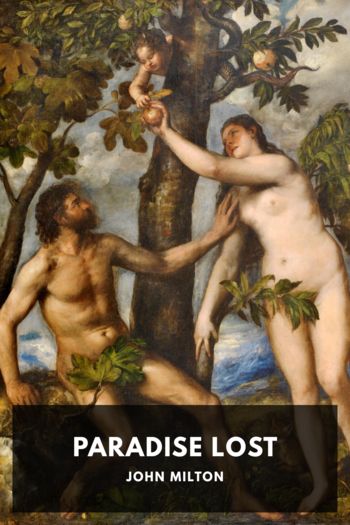Table-Talk by William Hazlitt (best pdf reader for ebooks txt) 📕

- Author: William Hazlitt
Book online «Table-Talk by William Hazlitt (best pdf reader for ebooks txt) 📕». Author William Hazlitt
“And Love himself can flatter me no more.”
It was not so ten years since (ten short years since.—Ah! how fast those years run that hurry us away from our last fond dream of bliss!) when I loitered along thy green retreats, O Twickenham! and conned over (with enthusiastic delight) the chequered view which one of thy favourites drew of human life! I deposited my account of the play at the Morning Chronicle office in the afternoon, and went to see Miss Stephens as Polly. Those were happy times, in which she first came out in this character, in Mandane, where she sang the delicious air, “If O’er the Cruel Tyrant, Love” (so as it can never be sung again), in Love in a Village, where the scene opened with her and Miss Matthews in a painted garden of roses and honeysuckles, and “Hope, Thou Nurse of Young Desire” thrilled from two sweet voices in turn. Oh! may my ears sometimes still drink the same sweet sounds, embalmed with the spirit of youth, of health, and joy, but in the thoughts of an instant, but in a dream of fancy, and I shall hardly need to complain! When I got back, after the play, Perry called out, with his cordial, grating voice, “Well, how did she do?” and on my speaking in high terms, answered, that “he had been to dine with his friend the Duke, that some conversation had passed on the subject, he was afraid it was not the thing, it was not the true sostenuto style; but as I had written the article” (holding my peroration on the Beggar’s Opera carelessly in his hand), “it might pass!” I could perceive that the rogue licked his lips at it, and had already in imagination “bought golden opinions of all sorts of people” by this very criticism, and I had the satisfaction the next day to meet Miss Stephens coming out of the editor’s room, who had been to thank him for his very flattering account of her.
I was sent to see Kean the first night of his performance in Shylock, when there were about a hundred people in the pit; but from his masterly and spirited delivery of the first striking speech, “On such a day you called me a dog,” etc., I perceived it was a hollow thing. So it was given out in the Chronicle; but Perry was continually at me as other people were at him, and was afraid it would not last. It was to no purpose I said it would last: yet I am in the right hitherto. It has been said, ridiculously, that Mr. Kean was written up in the Chronicle. I beg leave to state my opinion that no actor can be written up or down by a paper. An author may be puffed into notice, or damned by criticism, because his book may not have been read. An artist may be overrated, or undeservedly decried, because the public is not much accustomed to see or judge of pictures. But an actor is judged by his peers, the play-going public, and must stand or fall by his own merits or defects. The critic may give the tone or have a casting voice where popular opinion is divided; but he can no more force that opinion either way, or wrest it from its base in common sense and feeling, than he can move Stonehenge. Mr. Kean had, however, physical disadvantages and strong prejudices to encounter, and so far the liberal and independent part of the press might have been of service in helping him to his seat in the public favour. May he long keep it with dignity and firmness!85
It was pretended by the Covent Garden people, and some others at the time, that Mr. Kean’s popularity was a mere effect of love of novelty, a nine days’ wonder, like the rage after Master Betty’s acting, and would be as soon over. The comparison did not hold. Master Betty’s acting was so far wonderful, and drew crowds to see it as a mere singularity, because he was a boy. Mr. Kean was a grown man, and there was no rule or precedent established in the ordinary course of nature why some other man should not appear in tragedy as great as John Kemble. Farther, Master Betty’s acting was a singular phenomenon, but it was also as beautiful as it was singular. I saw him in the part of Douglas, and he seemed almost like “some gay creature of the element,” moving about gracefully, with all the flexibility of youth, and murmuring Aeolian sounds with plaintive tenderness. I shall never forget the way in which he repeated the line in which young Norval says, speaking of the fate of two brothers:
“And in my mind happy was he that died!”
The tones fell and seemed to linger prophetic on my ear. Perhaps the wonder was made greater than it was. Boys at that age can often read remarkably well, and certainly are not without natural grace and sweetness of voice. The Westminster schoolboys are a better company of comedians than we find at most of our theatres. As to the understanding a part like Douglas, at least, I see no difficulty on that score. I myself used to recite the speech in Enfield’s Speaker with good emphasis and discretion when at school, and entered, about the same age, into the wild sweetness of the sentiments in Mrs. Radcliffe’s Romance of the Forest, I am sure, quite as much as I should do now; yet the same experiment has been often tried since and has uniformly failed.86
It was soon after this that Coleridge returned from Italy, and





Comments (0)